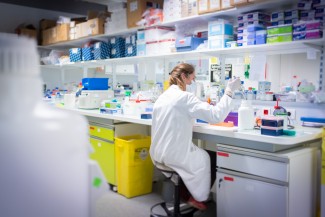Translational research aims to transform discoveries, observations and ideas developed in the laboratory into practical applications with the objective of improving human health. This process is often described as a "bench-to-bench" approach from laboratories to patients’ beds, reflecting the fact that basic knowledge from basic research is converted into new therapies, treatments, diagnostics or clinical procedures.
From Discovery to Clinical Application
Translational research is at the interface between basic and clinical research.
So-called fundamental scientists discover new biological, genetic or physiological processes, often without any direct and immediate application. Translational scientists build on these discoveries and explore how they can be used to diagnose, prevent or treat diseases. Clinical scientists assess the safety and efficacy of clinical trials in healthy or ill volunteers.
Phases of Translational Research
Translational research is generally divided into two main phases:
- the first translational phase involves the translation of knowledge from basic research into a potential concept or product for clinical use. This often includes the development of drugs, medical devices, diagnostics or even therapies;
- the second translational phase is to translate these concepts or products into actual clinical applications, including clinical trials and the evaluation of their efficacy and safety in humans.
The Challenges of Translational Research
Translational research faces many challenges. One of the most significant is the one referred to as the "valley of death" which describes the difficulty of moving from basic research to clinical applications. Financial, regulatory and logistical obstacles all play a role in this challenge, which requires strong responses.
Interdisciplinary collaboration
A critical aspect of translational research is collaboration across diverse fields. Biologists, physicians, pharmacologists, bioinformaticians, engineers and other professionals must work together to effectively translate scientific discoveries into clinical treatments.
Funding and Support
Funding for translational research comes from a variety of sources, including governments, private institutions and the generosity of the public.
Support research at Paris Brain Institute
You can support research by making a donation to Paris Brain Institute.
Impact on Public Health
The impact of translational research on public health is profound. It has led to the development of many revolutionary treatments, significantly improving the quality of life of patients and, in some cases, saving lives.
The Future of Translational Research
With continuing advances in science and technology, including genomics, artificial intelligence and biotechnology, the potential for translational research continues to grow. The future promises more personalized approaches to medicine, faster and more accurate diagnosis, and more effective treatments for an ever-widening range of diseases.
Translational Research at Paris Brain Institute
Paris Brain Institute was conceived with the objective of eliminating as much as possible the theoretical, material and financial barriers between basic research, applied research, clinical research, translational research, etc. That is why Paris Brain Institute brings together researchers, clinicians, patients, startups and much more to maximize interactions, create simulations and accelerate clinical applications.
Thus, hypotheses proposed in basic research can be tested or invalidated clinically, and clinical observations can serve as the genesis for basic research projects, mobilizing multiple research teams and enabling the development of solutions.







